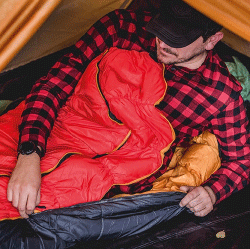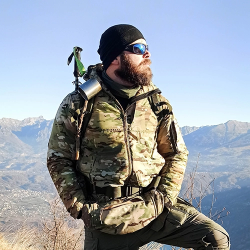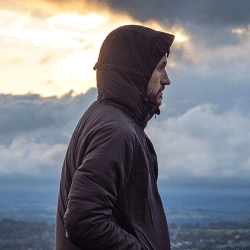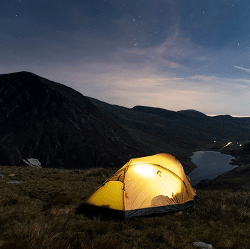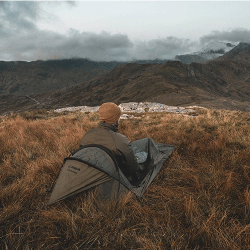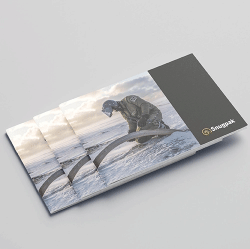

The Essential Solo Wild Camping Checklist
Wild camping is a thrilling and immersive experience that allows outdoor enthusiasts to connect with nature, often on a deeply personal level. For those who prefer to adventure in solitude, solo wild camping is the ultimate way to escape the hustle and bustle of modern life and rediscover the wonders of the great outdoors.
However, to make the most of your trip, it’s crucial to be well-prepared and fully equipped. In this article, we’ve put together the essential checklist for solo wild camping to ensure you have a safe and comfortable journey into the wilderness.
Shelter and Sleeping Gear
- Snugpak Tent or Bivvi Bag
Opt for a lightweight, weather-resistant tent or bivvi bag to protect you from the elements. For your solo trip, we’d recommend the Ionosphere IX - our lightest one person tent. It’s highly compact, and keeps a low profile, meaning that you won’t be exposed. The Ionosphere is also weather and bug-resistant, so you can enjoy a good, undisturbed night’s sleep!
If it’s the bare minimum you’re after, the Snugpak Bivvi Bag is a great option. Waterproof, windproof, warm, and cosy, when you’re tucked up in the Bivvi Bag, you’ll sleep safe and sound.
- Sleeping Bag
Don’t scrimp on quality - make sure your sleeping bag is suitable for the season, and will keep you warm and dry. The Snugpak Softie® is durable, breathable, and water-repellent, and folds down into a compact stuff sack, making it the perfect sleeping bag to take on your trip.
- Sleeping Pad or Mat
Keep comfortable with a good sleeping mat. Our range of sleeping mats are designed to keep you well-rested and refreshed, all set for a good night’s sleep. Make sure to go for one that can be easily packed down and stored.
Navigation
- Map & Compass
Especially if you’re in unfamiliar terrain, it’s essential to carry a detailed map and a reliable compass. Don’t just rely on your phone - solo camping comes with the risk of getting lost, so try to minimise this as much as possible by being prepared for all possibilities.
- Smartphone/GPS Device
As well as a map and compass, keep your phone (with GPS on) or a GPS device on you. There’s no harm in having additional navigation assistance - just make sure to bring a backup power source!
Clothing
- Weather-Appropriate Clothing
Check the weather forecast before your trip, and bring the correct clothes for the conditions. Whatever you’re expecting, take waterproof and windproof layers. You never know what to expect, especially not in the UK!
At Snugpak, we’ve got a wide range of clothing to choose from, whether you’re looking for warm, cosy insulation, or a rain poncho.
- Extra Socks & Underwear
Don’t get caught short - always bring extras! Even if you’re only camping for a night, you’ll thank yourself for taking extra socks if you’re stuck in bad weather.
We’d recommend our Merino Military Sock - they’re ideal for the cold, and will protect your feet from blisters. A great choice if you’re planning to walk long distances!
Food & Cooking
- Lightweight Cookware
Choose a compact and lightweight stove for cooking meals, with a pot and utensils, as well as a cup or mug for hot drinks.
- High-Energy Snacks
Nuts, energy bars, and dried fruits are perfect for quick, easy snacks on the go.
- Dehydrated Meals
Pre-packaged dehydrated meals are easy to prepare, and minimise waste.
- Water & Water Filter
Bring an ample supply of water, as well as a water filter, so you can refill from natural sources.
Hygiene & First Aid
- First Aid Kit
Assemble a comprehensive first aid kit with all the essentials, like bandages, antiseptic wipes, painkillers, and any personal medications. Prepare for any emergencies!
- Biodegradable Soap
Carry biodegradable soap to minimise environmental impact when cleaning yourself and your dishes.
- Toilet Kit
Be environmentally responsible, and pack a small trowel and loo roll for proper waste disposal.
Lighting
- Headlamp or Flashlight
Ensure you have a reliable light source for navigating during the night. Wild camping gets dark!
Fire-Starting Equipment
- Waterproof Matches or Lighter
Waterproof matches and a dependable lighter are essential for starting fires.
- Multi-Tool or Knife
Carry a versatile multi-tool or a reliable camping knife, handy both for cooking and for getting wood ready for a fire.
Personal Items
- Identification
Always carry a form of ID, like your driver’s licence or passport, in case of emergencies.
- Cash
Keep some cash on hand, too, for any unforeseen circumstances (or emergency shopping trips!).
Leave No Trace
- Respect nature and your surroundings, and follow the principles of ‘Leave No Trace’. Clean up after yourself, don’t make too much noise whilst camping, and avoid leaving any trace of your presence. Have a look at the Leave No Trace website for more information.
Before embarking on your solo wild camping adventure, familiarise yourself with the regulations and guidelines of the area you plan to visit. Always inform someone you trust about your itinerary and expected return date. Solo wild camping is a life-enriching experience, and with the right preparation, and the assistance of high-quality gear from Snugpak, you’ll be ready to embrace the beauty and solitude of the wilderness like never before.
Happy camping!

